Photographs: Sean Gallup/Getty Images Kanwal Sibal
Events in the Ukraine have a relevance that goes beyond Ukraine itself, says former foreign secretary Kanwal Sibal, himself a former Indian ambassador to Russia.
The plot is aimed at bringing about regime change today in the Ukraine and tomorrow in Russia itself.
Developments in Ukraine are part of the after-shocks from the seismic collapse of the Soviet Union.
The incorporation of the Baltic States into the European Union and the North Atlantic Treaty Organisation, apart from the former East European countries, was the first important geo-political after-shock, followed by the break-up of Yugoslavia.
The November 2004 to January 2005 Orange revolution in the Ukraine was another far more geo-politically important aftershock, though it proved abortive.
Similar attempted revolutions in Central Asia with Western support to pressure Russia geo-politically from the east did not succeed either.
The current developments there are a continuation of the US/EU project of extending the political, economic and security frontiers of the West into the heartland of the erstwhile Soviet Union.
The objective is to geo-politically weaken Russia gravely by prising its external periphery out of its control as much as possible.
Please ...
It's Moscow, not Crimea, that's the real target, stupid!
Image: US Secretary of State John Kerry.Photographs: Kevin Lamarque/Reuters Kanwal Sibal
Limiting its political influence in its near-abroad would naturally limit Russia's global influence and reduce it to a regional power.
The democratic principle and the lure of EU prosperity to which the former Soviet bloc countries are particularly vulnerable have been deployed as weapons in the Ukraine.
They were employed in East Europe earlier.
It can be legitimately argued that the Ukraine as an independent country should have freedom of choice with regard to its external affiliations, but this argument is vitiated by external interference and geo-political calculations that seek to orient that choice in a certain direction, in this case to push Ukraine out of the Russian orbit.
The US and the EU are exploiting weak Ukrainian national sentiment, corrupt governance -- President Yanukovich was no exception -- and serious divisions in the country to advance their geo-political goals, especially the pro-European and anti Russian orientation of western Ukraine which is relatively poor, agricultural and catholic as against the eastern part which is richer, industrialised, orthodox and Russia oriented.
Please ...
It's Moscow, not Crimea, that's the real target, stupid!
Image: Artist Kaya Mar holds a satirical painting depicting US President Barack Obama and Russia's President Vladimir Putin in Ukraine.Photographs: Suzanne Plunkett/Reuters Kanwal Sibal
President Putin's project of a Eurasian Union as a counter to the European Union, in which the Ukraine will be a crucial member, does not suit the West as it would help Russia consolidate its position in key parts of the former Soviet Union, create a better balance in Europe as a whole and enable Russia to deal with EU and NATO with a stronger hand.
One Cold War had ended, much to the relief of Europeans and countries beyond.
Now another Cold War is being provoked, this time on a limited geographical scale, confined to Europe essentially, but if it continues, the effects will begin to be felt beyond, even though Russian power has been weakened considerably.
Despite this the phobia of a strong Russia has not disappeared in the West. In western European thinking unless Russia becomes truly 'European', that is, imbibes Western political, economic and social values, it will remain a threat.
Russia must also give up its great power reflexes and accept its diminished status as simply a big European power, not an equal to the EU as a whole.
Please ...
It's Moscow, not Crimea, that's the real target, stupid!
Image: Russia's President Vladimir Putin.Photographs: Yuri Kodobnov/Pool/Reuters Kanwal Sibal
Events in the Ukraine have a salience that goes beyond Ukraine itself.
The eventual target is a change of regime in Russia itself led by local pro-democracy and pro-European forces that are weak for the moment, but are being bolstered by the West by various forms of engagement and exaggerated media projection.
The systematic vilification of Putin personally should be understood in this context.
His strong leadership is seen as standing in the way of the change that the US and the EU would like to see happen in Russia, one that will allow them to exercise control over its politics and economics from within.
The democracy and market economy ploy is handy for bringing about regime change today in the Ukraine and tomorrow in Russia itself.
Russia has, over the years, managed the ups and downs and political confusion in Ukraine as well as Western interference there with considerable forbearance despite its high geo-political, economic, cultural and ethnic stakes in that country.
It has been right in saying that developments in the Ukraine, to the extent that they are rooted in internal divisions, should be handled by the West and Russia through consultation rather than confrontation.
Its position that the Ukraine should not be confronted with an either/or choice between the EU and the Eurasian Union has been a realistic one.
Please ...
It's Moscow, not Crimea, that's the real target, stupid!
Image: A board showing currency exchange rates in Kiev.Photographs: Konstantin Chernichkin/Reuters Kanwal Sibal
While it is true that western Ukrainians would prefer the EU option over the less attractive Eurasian option that would mean the domination of the Russian political and economic model, the eastern Russia-speaking Ukrainians would not want to enter into a process that would detach them from Russia.
If the West can use the lure of economic prosperity to wean away the Ukraine from Russia, it can hardly be outraged by President Putin's $15 billion offer to Ukrainian President Yanukovich to reject the Association Agreement with the EU.
In actual fact, the EU can hardly come to the rescue of the virtually bankrupt Ukrainian state, given its own economic woes.
The $1 billion Eximbank loan the US is offering and the $11 billion the EU is pledging seems a desperate attempt to contain the consequences of their folly in encouraging the de-stabilisation of the Ukraine.
The geo-politics of Germany is important in this context as the economic burden of supporting such a large state in demographic and physical terms would fall on it principally.
Given the experience of the EU and Germany in handling the Greek crisis, it is difficult to see how the West can assume the economic burden of saving the Ukraine from economic collapse, especially if Russia ceases selling gas to it at subsidised prices.
The Pandora's Box has been recklessly opened up in the Ukraine by the West.
Please ...
It's Moscow, not Crimea, that's the real target, stupid!
Image: Troops under Russian command, before firing weapons into the air at an approaching group of over 100 unarmed Ukrainian troops at the Belbek airbase, which the Russian troops are occcupying, in Crimea.Photographs: Sean Gallup/Getty Images Kanwal Sibal
Russia's defensive national interests in the Ukraine are hardcore, far weightier than the offensive ones of the West.
The Soviet collapse left millions of unprotected Russians outside Russia's present borders, including in the Ukraine.
It is to Russia's credit that it has politically tolerated the ethnic and linguistic discrimination against them by the governments of the countries in which they found themselves and has sought to deal with the problem peacefully.
Russia has no defensible borders with the Ukraine.
The economies of the two countries are intermeshed. Russia's Black Sea will become vulnerable if the West extends its control over the whole of the Ukraine.
Crimea's arbitrary transfer from Russia to the Ukraine in 1954 by then Soviet leader Nikita Khruschev adds to the complexity of the issues involved.
It is not surprising therefore that Russia is defending its interests robustly.
Please ...
It's Moscow, not Crimea, that's the real target, stupid!
Image: US Secretary of State John Kerry lays roses atop the Shrine of the Fallen in Kiev.Photographs: Mykhailo Markiv/Reuters Kanwal Sibal
US Secretary of State John Kerry's threat to isolate Russia economically, expel it from the G-8 and impose sanctions on it is open bullying of a big country like Russia and shows the ugly and arrogant side of US diplomacy.
Instead of dialoguing on equal terms with Russia, the approach is that of punishment and intimidation.
It carries a lesson for other, more vulnerable, powers that might be compelled to stand up to the US in their own national interest.
Kerry's harangue that 'You just don't in the 21st century behave in 19th century fashion by invading another country on a completely trumped up pretext' is deliciously ironic, especially if one recalls the US invasion of Iraq.
Now that Russia has been forced to play its card in Crimea, it is unclear how the Ukraine can be stitched together again in any compromise solution that will give the western Ukrainians and their US/EU backers what they want and the eastern Ukrainians and Russians what they seek.
A chasm of mistrust has been opened up between Russia and the West over a highly sensitive issue.
For India, such geo-political games in Europe that now presents itself as a continent of peace and settled borders, a model for conflict areas elsewhere in the world, are a disappointment, given our close ties with Russia as well as the EU.
We have strategic relations with both entities.
Be that as it may, regime change policies through street violence backed by external interference threaten the global fabric of international relations and should not be countenanced by us.

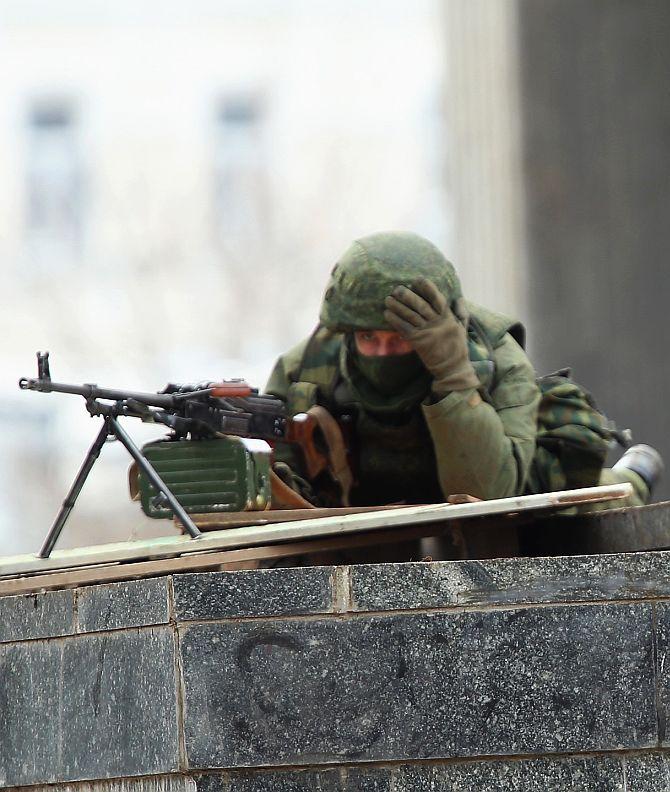
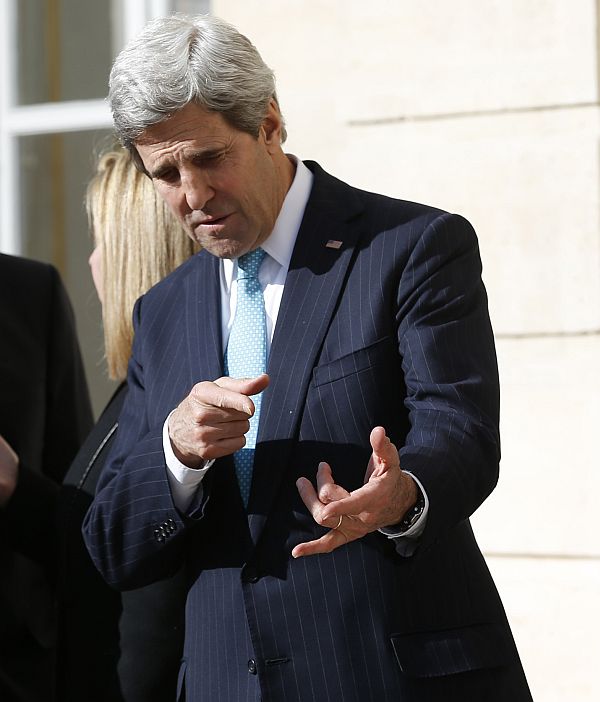
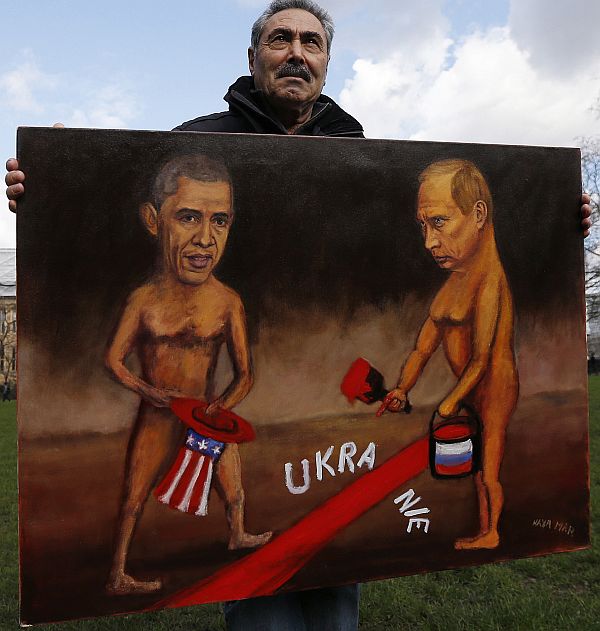
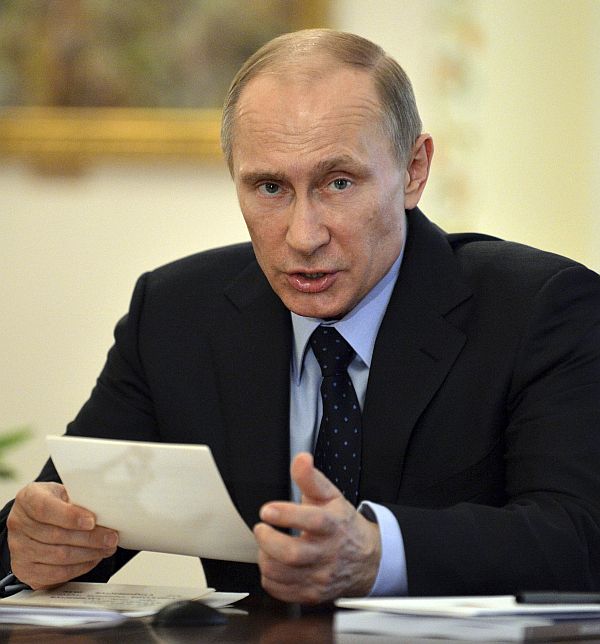
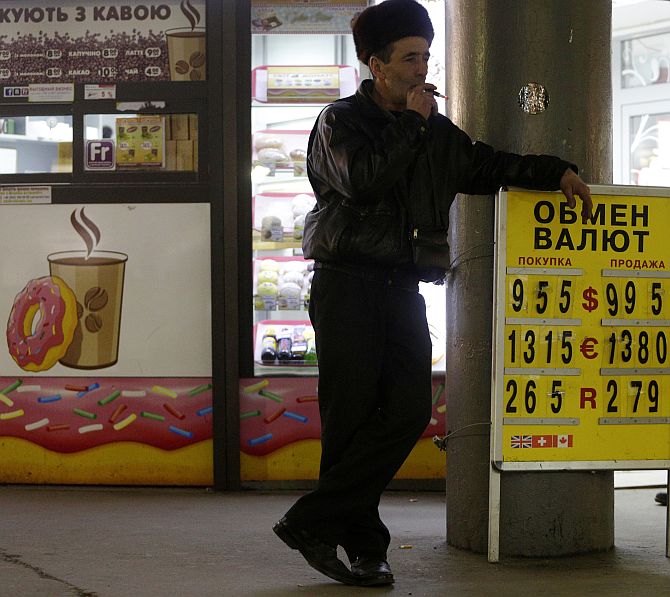
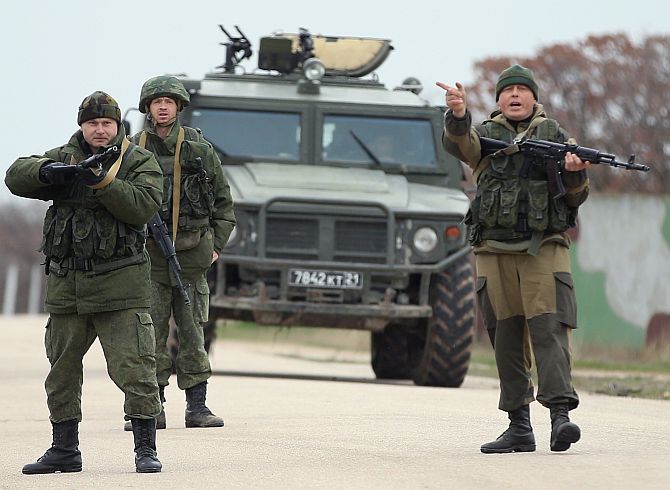
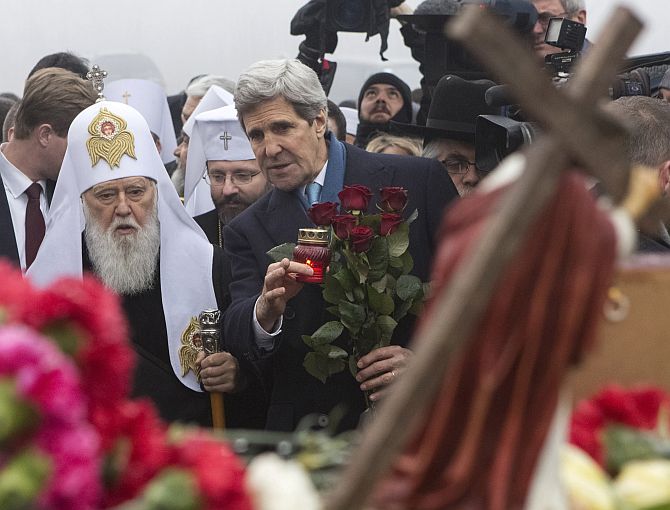
article